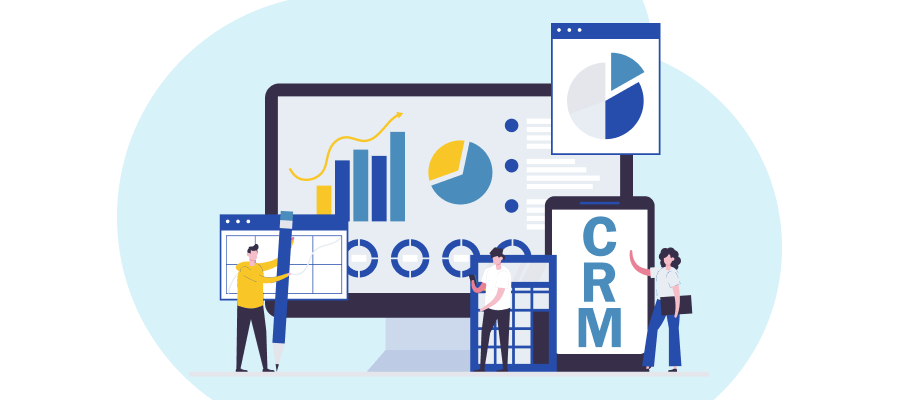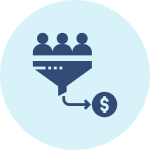The finance industry is extremely competitive. As such, every major player within it is constantly focused on delivering the best possible customer experience. Luckily, there is software that helps do precisely that — a CRM for financial services.
Yet, not all business leaders are aware of the power these systems hold, particularly for the finance sphere. Thus, we’ve decided to take some time to discuss CRM implementation in the context of financial services and share with you some of the key details about this technology.
Let’s get started.
How a CRM for Financial Services Differs

In simple terms, a CRM platform is used to manage a company’s interactions with clients, keep track of communication history, and facilitate collaboration among the sales, marketing, and customer support departments.
While this holds true for a financial CRM just as much as it does for a manufacturing or retail one, there are slight distinctions we ought to discuss. You see, when it comes to the finance industry, organizational workflows tend to differ.
Naturally, investment firms, venture capital funds, banks, and financial advisors focus a large portion of their work on dealing with funding requests, mergers and acquisitions, and the like. The entire business is often centered around this. Of course, such a unique set of services requires a solution that considers any potential nuances.
Read up on the Key Features of a CRM in Banking
Hence, a CRM for financial services will often need to cater to the requirements of not only sales and marketing departments but also advisory teams that regularly interact with existing or potential customers
Further, even the acquisition of new clientele isn’t always standard in finance, with many relying on word-of-mouth and personal referrals. As you can imagine, a good CRM platform should have customizable workflows that account for that.
Who Benefits From a Financial CRM
In finance, there are several business areas that benefit significantly from effective CRM implementation. Let’s briefly touch upon each one so that we are on the same page.
Sales and Marketing

The fact that the sales and marketing departments are the main ones to leverage a CRM is no surprise. These two areas of the business are responsible for attracting new customers, moving leads down the sales pipeline, and working on establishing lasting client loyalty. Naturally, they require software that can help with that.
Regardless of whether you run a bank or a private equity firm, you’ve definitely got sales and marketing teams that are eager to automate workflows, centralize client data, and capitalize on in-depth analytics that a CRM can provide.
Customer Service Department

Unsurprisingly the customer support team also relies heavily on a well-functioning CRM. After all, to help clients quickly and effectively, it’s important to know their unique profile and history with the company.
Plus, many financial CRMs actually connect with contact center solutions. Not only because such an integration allows for the relevant client profile to be pulled up quickly whenever a call is received but also because customer service departments are eager to streamline workflows. Since a CRM allows the information gathered during a call to be swiftly uploaded to the database, it is immensely helpful.
Discover how a CRM Improved FinTech Firm’s Customer Service
Financial Advisory Team

Lastly, in the financial sector, a CRM platform can also be used by a company’s advisory team. As we’ve briefly touched upon, organizations operating within this industry often offer financial consulting and advice for all kinds of clients.
Naturally, this type of work requires a tool that can keep track of a customer’s wealth, previous requests and investments, credit score, and other details that may help deliver top-notch services. So, while CRM software may not be implemented for financial advisors primarily, they would definitely benefit from having access to it.
5 Crucial Features of a Finance CRM
Now that we’ve established how a CRM for financial services may differ from platforms used in other industries, let’s take a look at the main features this tool should possess.

1. Contact and Deal Management
Contact and deal management is arguably the most essential function of a financial CRM. Having the ability to keep track of contacts, record any and all interactions, schedule calls, and see which stage of completion a deal may be at is a must.
Moreover, many modern CRMs allow you to attach contracts and other financial documents to the client’s record. Thus, ensuring that all your teams are working with the latest information and have a complete customer view to provide best-in-class service.
Don’t forget that without accurate contact coordination systems in place, your company may struggle with lead management and sales as potential customers will fall through the cracks. Of course, this will reflect negatively on the bottom line and is something that any leader should focus on avoiding.
Learn how a CRM Improves Lead Generation

2. Workflow Automation
Another important feature of any CRM, but especially one that is implemented in a busy business like finance, is automation. Getting rid of manual tasks is a top priority for organizations that are overwhelmed with repetitive work like data entry, on-boarding, frequent follow-ups, and the like.
Find out about the Powers of Hyperautomation
Thanks to a CRM’s workflow automation features, you can set up triggers that will carry out a series of actions whenever a specific event occurs. Thus, minimizing the need for human involvement.
For example, if a regular customer reaches out to inquire about an investment opportunity, but your team needs time to conduct a reliable assessment, automated emails can be created to keep him updated. That way, even if the financial advisory team takes some time to get back with a response, the client knows that he hasn’t been forgotten.

3. Marketing Campaign Administration
No CRM system is complete without a campaign management feature. After all, the marketing team will need to rely on customer insights to target and personalize promotional initiatives accurately.
So, if you’re on the hunt for a truly effective financial CRM, make sure your chosen tool has in-built business intelligence capabilities that can be used for customer segmentation, behavioral insights, and tracking of promotion performance. These functions will empower your marketing team and allow them to launch multichannel campaigns that deliver a maximum ROI. Who wouldn’t want that?

4. Data Analytics
It shouldn’t come as a surprise that reporting and analytics are an absolute must within a financial CRM. Since the solution already serves as a centralized resource of customer information, it would be a shame not to capitalize on all these details to uncover trends and patterns.
Financial services are largely centered around data anyway. Hence, your team will easily interpret the intelligent dashboards powered by data science and artificial intelligence that a CRM will showcase.
Take a look at the Impact of AI in Business
Overall, it’s a good idea for a financial CRM platform to deliver insights on sales and revenue levels, client’s portfolio investments, marketing initiative results, staff efficiency, and the like.

5. Complementary Software Integration
Lastly, when implementing a CRM for financial services, don’t forget to check that it can integrate with other software that your business frequently uses. It is essential for good performance in the long run.
For instance, you might have accounting software like QuickBooks and require the CRM to sync invoices and contact detail updates into it. If the chosen CRM platform doesn’t allow that — you might face unnecessary difficulties with data synchronization.
Check out how we Integrated a CRM with QuickBooks
Similarly, your finance business might be working with document management software, contact center solutions, and other valuable technologies. Customer-related data should sync seamlessly across all these platforms because that’s what will bring true efficiency.
Time to Implement a CRM for Finance
As you can see, there is a lot to unpack when it comes to implementing a CRM platform for finance. With the unique workflows of the businesses operating within this sector, it is natural for leaders to want a solution that can cater to the dynamic nature of their daily routines. Luckily, modern CRMs are up for the challenge.
So, if you’re looking to obtain a new solution for your company or customize an existing one — don’t hesitate to contact Velvetech. We specialize in the delivery of top-notch CRM implementation services and would be happy to help with whatever you require.









